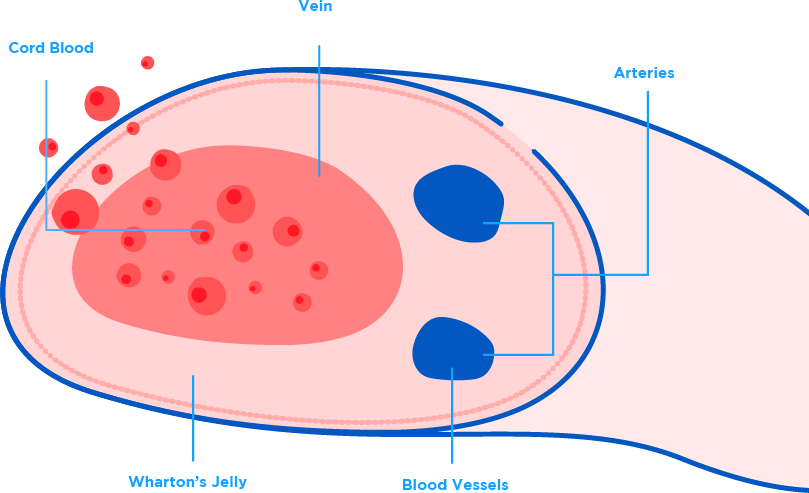Did You Know?
Cord Blood transplants have been around for over 30 years2, with the world’s first Cord Blood transplant taking place in October 19883.

Cord blood is the blood found in the baby’s umbilical cord, it is a rich source of Haemopoietic Stem Cells (HSCs). These stem cells make up the building blocks in our blood and immune system throughout our life. A baby’s own cord blood guarantees a perfect match for him/her. The cord blood can also potentially increase the chances of having a match for his/her siblings and parents.
The HSCs in Cord Blood can develop into all types of blood cells. These Stem Cells are similar to those found in an adult’s bone marrow and are clinically proven to be used in the treatment of more than 80 diseases1, such as blood disorders, certain childhood & blood cancers, metabolic disorders and immunodeficiency syndrome.
Doctors believe there is more potential, and research is ongoing to use Cord Blood to treat other diseases including Autism, Cerebral Palsy, Diabetes, Heart Disease, Strokes, and more. By storing your baby’s Cord Blood today, you will be able to tap on the new and ongoing medical advances in Regenerative Therapy and Cell & Gene Therapy.
A 100% match for your baby
Eliminates difficulties in finding a compatible donor
The sample is readily available, meaning no treatment delays and any potential disease progression can be avoided
It has the potential to be used as treatment options for family members
Cord Blood from a related donor will result in fewer complications and improved medical outcomes


Your baby’s Cord Blood Stem Cells have the potential to change lives, and treat a host of cancers, blood diseases and disorders for the entire family.
An autologous transplant, or transplant where the patient is their own donor, will have a lower risk of life-threatening complications. There is no risk of graft versus host disease (GVHD) and no need for the patient to undergo immunosuppressive therapy.
Where the patient receives his/her own stem cells.
Patient receives stem cells from a matching donor. Probability of a match is much higher among siblings and direct family members.
Name of Disease/Disorder |
Cord Blood Autologous |
Cord Blood Allogeneic |
|
| Acute Lymphoblastic Leukemia (ALL) |
|
||
| Acute Myelogenous Leukemia (AMLs) |
|
||
| Multiple Myeloma |
|
|
|
| Plasma Cell Leukemia |
|
|
|
| Hodgkin's Lymphoma |
|
|
|
| Non-Hodgkin's Lymphoma |
|
|
|
| Aplastic Anemia |
|
|
|
| Fanconi Anemia |
|
||
| Congenital Dyserythropoietic Anemia |
|
||
| Sickle Cell Disease |
|
||
| Beta Thalassemia Major |
|
||
| Neuroblastoma |
|
||
| Medulloblastoma |
|
||
The full list of diseases can be obtained from https://parentsguidecordblood.org/en/diseases
There are more than 1,000 clinical trials underway for Stem Cell therapies and treatments6.
With rapid advances in stem cell research, treatment methods using Cord Blood have the potential to change and save lives.
Read more about Cord Stem Cells
Name of Disease\Disorder |
Cord Blood Autologous |
Cord Blood Allogeneic |
| Alzheimer's Disease |
|
|
| Autism |
|
|
| Cerebral Palsy |
|
|
| Hearing Loss (Acquired Sensorineural) |
|
|
| Parkinson's Disease |
|
|
| Spinal Cord Injury |
|
|
| Stroke |
|
|
| Traumatic Brain Injury |
|
|
| Crohn’s Disease |
|
|
| Amyotrophic Lateral Sclerosis (ALS) |
|
|
| Graft-versus-Host Disease (GvHD) |
|
|
| Lupus |
|
|
| Rheumatoid Arthritis |
|
| Surgery for Congenital Heart Defects |
|
| Diabetes, Type 1 (Auto Immune) |
|
|
| Diabetes, Type 2 |
|
|
| Liver Cirrhosis |
|
|
| Liver Failure |
|
The full list of diseases can be obtained from https://parentsguidecordblood.org/en/diseases